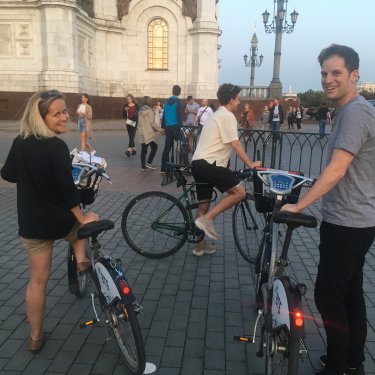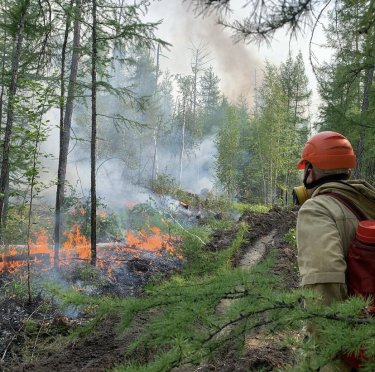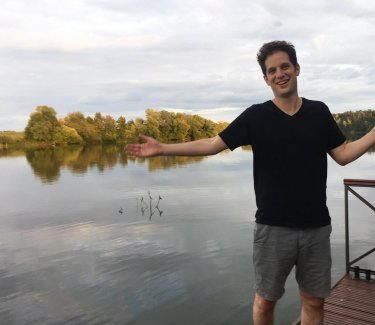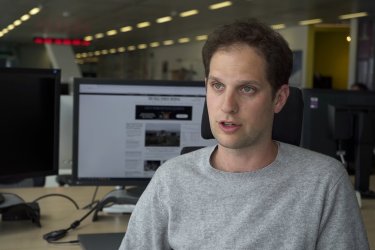"Evan Gershkovich Loved Russia, the Country That Turned on Him"

In support of American journalist Evan Gershkovich, who has been accused of espionage by the Russian security services and who has been detained since March 29 in Moscow, Reporters Without Borders (RSF), in partnership with the Wall Street Journal, is reprinting an article in his honor, which portrays a passionate and steadfast journalist, in total contrast with the espionage accusations levied against him.
THE WALL STREET JOURNAL
"Evan Gershkovich Loved Russia, the Country That Turned on Him"
The Wall Street Journal correspondent, whose parents fled the Soviet Union, made Moscow a second home. He was detained by the FSB and charged with espionage, an allegation the Journal vehemently denies.
By Joe Parkinson and Drew Hinshaw
The cellphone was no longer pinging. The last time Wall Street Journal staff heard from Evan Gershkovich was Wednesday, just before 4 p.m., when he had arrived at a steakhouse in the Russian city of Yekaterinburg. It was the Russia correspondent’s second trip to the Ural mountains in a month.
Shortly before lunch, a colleague wrote him a text: “Hey buddy, good luck today.”
“Thanks brotha,” replied Mr. Gershkovich: “I’ll let you know how it goes.”
Hours later, the Journal newsroom was scrambling to reach contacts in Yekaterinburg, Moscow and Washington. A vague post on the Russian messaging service Telegram reported that security agents had taken a diner from a Yekaterinburg steakhouse with his hood up.
At 10:35 a.m. Thursday morning Moscow time, an item from Russia’s state news agency said Mr. Gershkovich had been detained and accused of espionage by the Federal Security Bureau, the successor to the KGB. It was the first time Russia had brought a spy case against an overseas reporter since the Cold War. Images on Russian state television showed Mr. Gershkovich escorted by plainclothes FSB officers, wearing faded bluejeans and sneakers, a black-gloved hand around his stooped neck.
Mr. Gershkovich, 31 years old, is the American son of Soviet-born Jewish exiles who had settled in New Jersey. He fell in love with Russia—its language, the people he chatted with for hours in regional capitals, the punk bands he hung out with at Moscow dive bars. Now, espionage charges leave him facing a possible prison sentence of up to 20 years.
His employer, colleagues and the Biden administration all deny Russia’s claim that he was spying on behalf of the U.S., and have called for his immediate release. Diplomats and legal experts see little hope Mr. Gershkovich, a reporter accredited by the Russian foreign ministry, will immediately be freed, given that espionage trials in Russia are conducted in secret and almost always end in a conviction.
Five and a half years earlier, Mr. Gershkovich showed up in Russia as media freedoms were fading. He spent his weekends chatting about music, politics and the news in the banya, or sauna, and was always ready to help competing journalists. His Russian friends knew him not as Evan, but Vanya.
When forest fires swept through the remote Siberian region of Yakutia in 2021, he slept in a tent in the woods for four days, long after other reporters jetted back to the capital. He won the trust of freshman medical students by sitting with them in Covid-19 wards as they revealed that they’d been enlisted, after only a few weeks of training, to treat a flood of patients.
“I just want to get the story right,” he would tell friends.

Mr. Gershkovich could instead find himself ensnared in an increasingly common geopolitical gambit: governments grabbing Americans to trade them for a deal.
The U.S. in December released convicted Russian arms-trafficker Viktor Bout in an exchange for U.S. women’s basketball star Brittney Griner, whom Russian authorities had detained in the days before Russia invaded Ukraine in February 2022. Ms. Griner had been sentenced to nine years in a penal colony after being found carrying hashish oil in her luggage. She was later convicted of drug smuggling and possession.
On Thursday, National Security Council Strategic Coordinator John Kirby said it wasn’t clear if Mr. Gershkovich’s detention was coordinated with Russian leadership or retaliation for other grievances. Last week, a Russian national was charged in U.S. District Court in Washington, D.C., with acting as an agent of a foreign power, visa fraud, bank fraud, wire fraud and other charges, according to the Justice Department.
Ms. Griner’s detention ended decades of cooperation between Russia and the U.S. on sports. Mr. Gershkovich’s jailing challenges the bedrock notion that American reporters, authors, and researchers could work in Russia to learn about the vast and complicated country and its escalating conflict with the West. Nearly all Western journalists have pulled out of Russia, an exodus accelerated by Mr. Gershkovich’s arrest.
On Friday, the Journal withdrew its Moscow bureau chief, a veteran correspondent who has covered the country since the final years of the Cold War. Many Western news agencies that posted reporters to Moscow under Stalin have determined that President Vladimir Putin’s Russia is too dangerous for journalism.
Mr. Gershkovich, who hasn’t been granted access to the lawyer hired by the Journal, is being held at the FSB’s Lefortovo prison, where Russia holds most suspects in espionage cases. Paul Whelan, a former U.S. Marine jailed in 2020 and serving a 16-year sentence in a Russian prison colony on similar charges, was also initially held there.
This account of Mr. Gershkovich’s life and career is based on conversations with colleagues, family and people he interacted with professionally. His biography traces Mr. Putin’s efforts to rebuild an empire atop the former Soviet Union, a homeland his parents had fled only for their American son to return and wind up in the type of prison they had been taught to fear.
Soviet refugees
Mr. Gershkovich’s fascination with Russia stemmed from his earliest years speaking Russian at home in New York and New Jersey.
When his mother, Ella, was 22, she fled the Soviet Union using Israeli documents. She was whisked across the Iron Curtain by her own mother, a Ukrainian nurse and Holocaust survivor who would weep when she talked about the survivors of extermination camps she treated at a Polish military hospital at the end of World War II. Before fleeing, they heard rumors that Soviet Jews were about to be deported to Siberia.
Mr. Gershkovich’s father, Mikhail, also left the Soviet Union as part of the same Jewish migration wave. The two met in Detroit then moved to New Jersey where Evan and his elder sister, Dusya, grew up.
In magazine articles, Mr. Gershkovich reflected on the Russian superstitions his mother practiced at home; no whistling or opening umbrellas indoors and no setting keys or wallets on the dinner table.
He wrote in 2018 about eating macaroni with butter instead of cheese, watching “Nu, pogodi!” a Soviet cartoon about a wolf and a hare instead of “Hey Arnold!,” and speaking Russian instead of English.
This Russian life “was only a replica, but I was desperate to hold onto it,” Mr. Gershkovich said.
At his public high school in Princeton, Mr. Gershkovich was a top student and avid soccer player who captained the team in his senior year and led it to a state championship. Wayne Sutcliffe, physical education teacher and still the head soccer coach, said he has been fielding constant messages from Mr. Gershkovich’s teammates. “All of whom are trying to find a way we can help to support Evan’s family,” he said.
Mr. Gershkovich graduated from Bowdoin, a liberal-arts college in Maine, in 2014. He moved to New York to break into journalism. To pay off student loans, he worked as a cook for a catering company, heading to bars after his shift with seven different kitchen knives still on him. In 2016, he was hired by the New York Times as an assistant, a dream starter job, until a Times employee asked him why he didn’t use his Russian skills to crack one of the world’s most difficult beats.
Mr. Gershkovich hesitated, afraid of leaving a job in the New York Times headquarters. Then he leapt.
Career beginnings
Arriving in Russia, he joined the Moscow Times, an English-language paper that, though struggling, had long been a training ground for some of the most high-profile Russia correspondents. Mr. Gershkovich joined a team of young journalists who breathed life into the newsroom. “He loved Russia and he wanted to report from here,” said Pjotr Sauer, a Moscow Times colleague now at the Guardian.
Mrs. Gershkovich said this period made her son more interested in his Russian and Jewish roots. One day, decades after the fall of Communism, she took him to a building that she had been afraid to visit as a teenager: a synagogue. She had been told that anybody entering it would be photographed and detained by the secret service.
“That’s when Evan started to understand us better,” she said. Mr. Gershkovich’s father and sister later visited Moscow, and together they visited its new Jewish Museum.
Mr. Gershkovich won awards for his work at the Moscow Times, then moved to the Agence France-Presse. He traveled the country tackling topics off the beaten path, including environmental issues such as the disappearance of salmon from the Amur river. In another article, he chronicled efforts to rescue Russia’s obscure minority languages.
Nataliya Vasilyeva, a correspondent for Britain’s Telegraph newspaper, recalled seeing Mr. Gershkovich at a news conference held by a candidate challenging Mr. Putin in a 2018 presidential election. Sitting on the floor, he posed a question to the former collective farm boss in informal language, a faux pas in the peculiarities of Russian speech, eliciting smiles from the candidate and other reporters in the room.

Dressed in baggy faded jeans, Mr. Gershkovich would meet friends and colleagues at Veladora, a downtown Mexican restaurant, and also at a nearby kitsch cafe known to serve the best cheesecake in the city, which by now had become his second home.
He would blast 1990s Russian rock tunes from the apartment he shared with Russian roommates, and elicited laughs when he requested niche rock anthems from bands such as DDT.
At the end of 2021, Mr. Gershkovich later recalled, a colleague found him at a coffee shop, applying for a position with The Wall Street Journal. Mr. Gershkovich tilted his laptop to show him the application form, as if to encourage him to apply as well. He was hired in January 2022.
A month later, Russia invaded Ukraine and Mr. Gershkovich traveled to the Belarus-Ukraine border. That made him the only American reporter who could see the first wounded Russian forces being taken home.
Russia darkens
His adopted Moscow was starting to fill with fear and paranoia. “Reporting on Russia is now also a regular practice of watching people you know get locked away for years,” he tweeted in July. His regular visits to the Moscow sauna were reflecting the country’s darkening mood. One day, near the end of 2022, another bather heard him speaking English: “Stop speaking that f— language,” he said.
Mr. Gershkovich thought for a minute, then replied, in Russian: “This is a multilingual country.”
The man paused, then said back: “But English isn’t one of them.”
Moscow, he thought, increasingly felt like Russia’s chaotic and crime-shadowed ’90s as U.S.-led sanctions constrained the most Western-facing parts of the economy. For hours, deep into the evening, he discussed with colleagues, friends and sources how to cover a country warring with its neighbor to the west. He mused about covering Russia’s use of American prisoners as negotiating chips.
“It’s a constant moral crisis. You discuss every story,” said Polina Ivanova, a Financial Times correspondent and friend. “Evan would talk about…what it means to be covering Russia rather than Ukraine. It’s a very difficult thing to get your head around, and where you sit in relation to that in terms of your own identity.”

On one assignment, Mr. Gershkovich was followed by several Russian security officers, some of whom recorded his movements with a camera and pressured sources to not talk to him. He assumed his phone was monitored. On another trip, to the western region of Pskov, he was followed and filmed by unidentified men.
On Wednesday, when he traveled to Yekaterinburg, a Urals city nearly 900 miles east from Moscow, Mr. Gershkovich’s phone, like those of many Journal foreign correspondents, was loaded with a GPS tracking app that enabled colleagues to see his movements.
“Landed, out the airport,” he wrote at 1:59 p.m.
Thomas Grove, a longtime Russia reporter for the Journal, now covering Poland, was on his way to a Warsaw dinner when he noticed Evan hadn’t texted him for hours. He texted a Journal security manager at 7:12 p.m., “Have you been in touch with Evan?”
“Working on it.”
“Phone is off.”
Mr. Grove knew an acquaintance of Mr. Gershkovich, and called to ask him to drive by the apartment where Mr. Gershkovich was staying. The windows were dark. While Mr. Grove stayed on the phone, the man cut the engine and rang the doorbell. He rang it again.
“He’s not there,” he said. “Let’s hope for the best.”
The next morning, Russian news crews managed to catch a glimpse of Mr. Gershkovich being escorted past a stairwell, his head under a jacket, wearing his baggy blue jeans.
—Jared Malsin contributed to this article.
Write to Joe Parkinson at joe.parkinson@wsj.com and Drew Hinshaw at drew.hinshaw@wsj.com
This article was originally published on March 31, 2023 on WSJ.com
